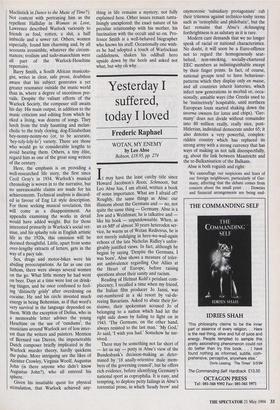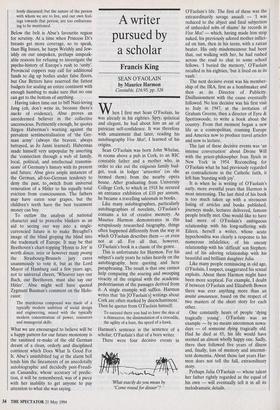Yesterday I suffered, today I loved
Frederic Raphael
WOTAN, MY ENEMY by Leo Abse Robson, ┬Ż18.95, pp. 274 It may have the least catchy title since Howard Jacobson's Roots, Schmoots, but Leo Abse has, I am afraid, written a book of some importance. What am I afraid of? Roughly, the same things as Abse: our illusions about the Germans and ŌĆö no, not quite the same thing ŌĆö Germany. Abse is a Jew and a Welshman; he is talkative and ŌĆö like his book ŌĆö unputdownable. When, as an ex-MP of almost 30 years heterodox ser- vice, he warns us of Wotan Redivivus, he is not merely indulging in here-we-wail-again echoes of the late Nicholas Ridley's unfor- givably justified views. In fact, although he begins by saying 'Despite the Germans, I was born', Abse shows a measure of toler- ant ambivalence regarding Our Allies at the Heart of Europe, before raising questions about their sanity and racism. Reading of Helmut Kohl's petulant com- placency, I recalled a time when my friend, the Italian film producer Jo Janni, was out-numbered in a ski resort by val-de- reeing Bavarians. Asked to abate their for- tissimo, their spokesman accused Jo of belonging to a nation which had let the right side down by failing to fight on in 1943. 'The Germans, on the other hand, always resisted to the last man.' My God,' Jo said, 'I wish you had.' Somehow he sur- vived.
There may be something not far short of ŌĆö let us say ŌĆö potty in Abse's view of the Bundesbank's decision-making as deter- mined by '18 anally-retentive male mem- bers of the governing council', but he offers rich evidence, before identifying Germany's national sport as coprophilia. It is easy, and tempting, to deplore petty failings in Abse's torrential prose, in which 'heady brew' and oxymoronie 'subsidiary protagonists' rub their triteness against technico-toshy terms such as 'ocnophilic and philobatic', but the fact remains that Abse's Achtunging forthrightness is as salutary as it is rare.
Modern cant demands that we no longer speak of racial or national characteristics. No doubt, it will soon be a Euro-offence not to regard the homogenously seat- belted, non-smoking, socially-chartered EEC members as indistinguishable except by their finger prints. In fact, of course, national groups tend to have behaviour- patterns which they display only en masse, and all countries inherit histories, which infect new generations in morbid or, occa- sionally, amiable ways (the Greeks used to be 'instinctively' hospitable, until northern European louts started shaking down the taverna owners for lotus and chips). 'Ger- many' does not divide without remainder into 80 million really, really nice, post- Hitlerian, individual democrats under 65; it also denotes a very powerful, complex- ridden country which has replaced its strong army with a strong currency that has ways of making us not talk disrespectfully, eg, about the link between Maastricht and the re-Balkanisation of the Balkans.
Abse is both roguish and right:
We camouflage our suspicions and fears of our foreign neighbours, particularly of Ger- many, affecting that the debate comes from concern about the small print . . . Dowries and financial arrangements are being end- lessly discussed; but the nature of the person with whom we are to live, and our own feel- ings towards that person, are too embarrass- ing to be mentioned.
Below the belt is Abse's favourite region for scrutiny. At a time when Princess Di's breasts get more coverage, so to speak, than Big Issues, he harps Welshly and Jew- ishly on our unspoken, perhaps unspeak- able reasons for refusing to investigate the psycho-history of Europe's rush to 'unity'. Provincial coppers may call for additional funds to dig up bodies under false floors, but Our Betters have reserved the fattest budgets for sealing an entire continent with enough humbug to make sure that no one can get to the bottom of anything.
Having taken time out to biff Nazi-loving Jung (oh, don't write in, because there's stacks of evidence), Abse proves an unredeemed believer in the collective unconscious. Pertinently enough, he quotes Jurgen Habermas's warning against the prevalent sentimentalisation of 'the Ger- man army' (always the bravest, always betrayed, as Jo Janni learned). Habermas made himself very unpopular by asserting the 'connection through a web of family, local, political, and intellectual transmis- sions' of Germany's history with its present and future. Abse gives ample instances of the German, all-too-German tendency to deny the past, to, switch from universal veneration of a Hitler to his equally total eviction from consciousness. The fathers may have eaten sour grapes, but the children's teeth have the best treatment money can buy.
To outlaw the analysis of national character and to prescribe blinkers as an aid to seeing our way into a single- currencied future is to make Breughel's image of the blind groping the blind into the trademark of Europe. It may be that Beethoven's chart-topping 'Hymn to Joy' is worth douze, seize or however many pwang the Strasbourg-Brussels jury cares unanimously to vote it, but as the Lord Mayor of Hamburg said a few years ago, not to universal cheers, 'Whoever says our Bach, our Beethoven, must also say our Hitler'. Abse might well have quoted Zygmunt Bauman's comment on the Holo- caust:
The murderous compound was made of a typically modern ambition of social design and engineering, mixed with the typically modem concentration of power, resources and managerial skills.
What we are encouraged to believe will be a happy pattern for our future monotony is the sanitised re-make of the old German dream of a clean, orderly and disciplined continent which Does What Is Good For It. Abse's uninhibited tug at the alarm bell lends him the lineaments of an anecdotally autobiographic and decidedly post-Freudi- an Cassandra, whose accuracy of predic- tion, it will be remembered, was of a piece with her inability to get anyone to pay attention to what she was saying.





































































 Previous page
Previous page